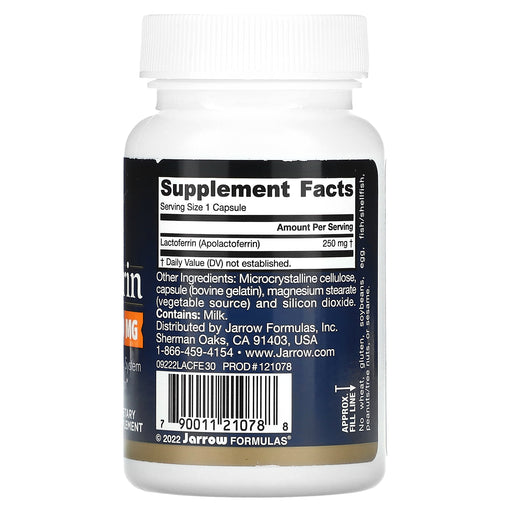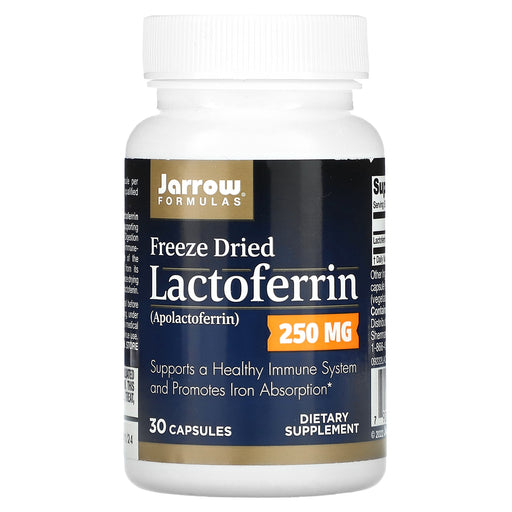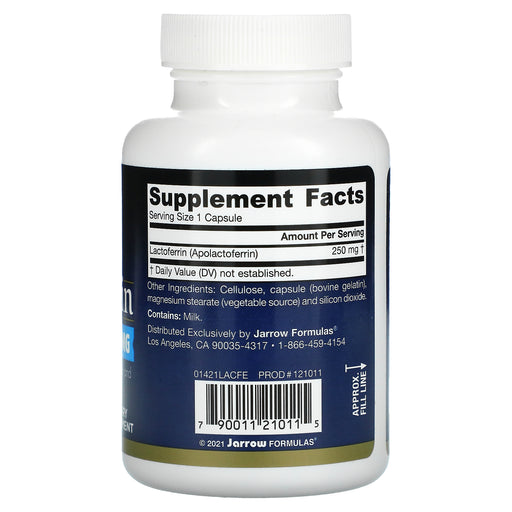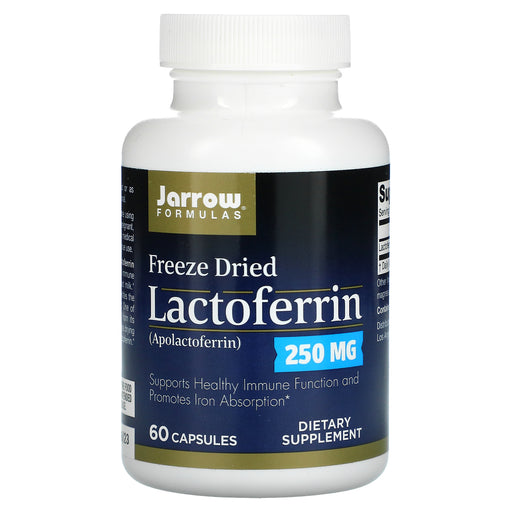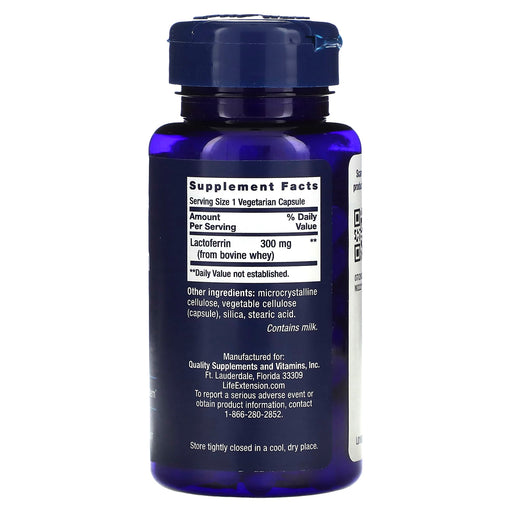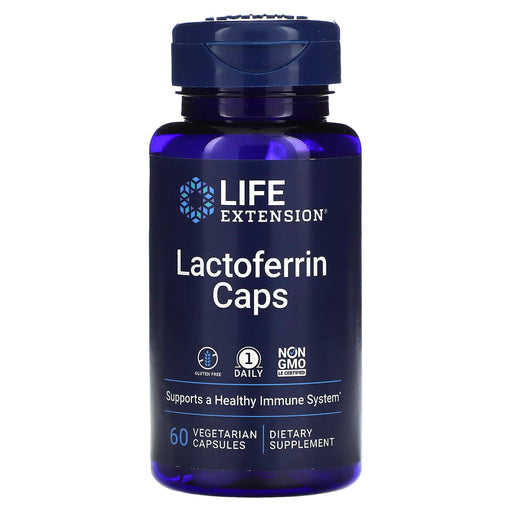
Harness the Immune-Boosting Power of Lactoferrin for Optimal Health and Protection
Lactoferrin is a multifunctional protein found naturally in human milk, tears, saliva, and other bodily fluids, known for its potent immune-supporting, antimicrobial, and antioxidant properties. As a key component of the body's innate immune defense system, lactoferrin helps to protect against harmful pathogens, regulate inflammation, and promote the growth of beneficial gut bacteria. By incorporating lactoferrin supplements into your wellness routine, you can harness the power of this remarkable protein to support your body's natural defenses, promote digestive health, and enhance overall well-being.
The Multifaceted Benefits of Lactoferrin for Immune Health and Beyond
Lactoferrin's unique structure and diverse functions make it a powerful ally in supporting immune health, gut function, and overall wellness. Some of the key benefits of lactoferrin include:
- Antimicrobial Activity: Lactoferrin has been shown to exhibit potent antimicrobial properties, helping to inhibit the growth and adhesion of harmful bacteria, viruses, and fungi, thus supporting the body's natural defenses against infection.
- Immune System Modulation: Lactoferrin plays a role in regulating immune function, helping to stimulate the production of immune cells, enhance the activity of natural killer cells, and modulate the inflammatory response.
- Gut Health Support: Lactoferrin helps to promote the growth of beneficial gut bacteria, such as Bifidobacterium and Lactobacillus, while inhibiting the growth of harmful pathogens, thus supporting a healthy gut microbiome and digestive function.
- Antioxidant Protection: As an iron-binding protein, lactoferrin helps to regulate iron levels in the body, reducing the risk of iron-induced oxidative stress and promoting overall cellular health and protection.
- Wound Healing and Tissue Repair: Lactoferrin has been shown to support the healing of damaged tissues, promote the growth of new cells, and reduce inflammation, making it a valuable nutrient for wound healing and recovery.
The Science Behind Lactoferrin's Immune-Boosting Properties
Numerous studies have investigated the immune-supporting effects of lactoferrin, revealing its multifaceted role in promoting optimal immune function and protection. Some of the key scientific findings include:
- Antimicrobial Activity: In vitro studies have demonstrated lactoferrin's ability to inhibit the growth and adhesion of a wide range of harmful pathogens, including E. coli, Salmonella, and Candida albicans.
- Immune Cell Modulation: Animal and human studies have shown that lactoferrin supplementation can help to increase the production and activity of various immune cells, such as natural killer cells, neutrophils, and T-lymphocytes.
- Gut Health Improvement: Clinical trials have found that lactoferrin supplementation can help to promote the growth of beneficial gut bacteria, reduce the incidence of gastrointestinal infections, and alleviate symptoms of digestive disorders like inflammatory bowel disease (IBD).
- Respiratory Health Support: Some studies suggest that lactoferrin supplementation may help to reduce the severity and duration of respiratory tract infections, such as the common cold and influenza.
- Anti-Inflammatory Effects: Lactoferrin has been shown to exhibit anti-inflammatory properties, helping to reduce levels of pro-inflammatory cytokines and promote a balanced immune response.
Choosing the Right Lactoferrin Supplement
When selecting a lactoferrin supplement, it's essential to choose a high-quality product from a reputable brand. Look for supplements that:
- Provide pure, high-quality lactoferrin derived from bovine milk, which is structurally similar to human lactoferrin and has been extensively studied for its health benefits
- Offer a clinically effective dosage, typically ranging from 100mg to 1000mg per day, depending on individual needs and health goals
- Are manufactured in cGMP-certified facilities to ensure purity, potency, and safety
- Are free from unnecessary additives, fillers, and allergens
- Are independently tested for quality and purity by third-party laboratories
As with any new supplement, it's essential to consult with a healthcare professional before starting lactoferrin, especially if you have a pre-existing health condition, are pregnant or nursing, or are taking medications.
Related Vitamins and Supplements
While lactoferrin is a powerful immune-supporting protein on its own, certain vitamins and supplements can complement its benefits and support overall health. Some relevant options to consider alongside lactoferrin include:
- Vitamin C: This essential vitamin is a potent antioxidant that supports immune function, collagen synthesis, and overall health, making it a valuable addition to a lactoferrin supplementation regimen.
- Probiotics: These beneficial bacteria support gut health and immune function, working synergistically with lactoferrin to promote a healthy gut microbiome and digestive function.
- Zinc: This essential mineral plays a crucial role in immune function, wound healing, and overall health, and has been shown to work synergistically with lactoferrin to support immune health.
- Omega-3 Fatty Acids: These anti-inflammatory fats support immune function, gut health, and overall well-being, complementing the immune-supporting benefits of lactoferrin.
Experience the Immune-Boosting Power of Lactoferrin
At Health Orchard, we are dedicated to providing our customers with the highest quality lactoferrin supplements to support immune health, gut function, and overall well-being. Our carefully curated selection features lactoferrin products from trusted brands, formulated with pure, high-quality ingredients for optimal efficacy and safety.
Whether you're looking to boost your body's natural defenses, promote digestive health, support wound healing, or simply enhance overall wellness, our lactoferrin supplement collection has the perfect product to meet your needs.
Witness the multifaceted benefits of lactoferrin and experience the difference it can make in your journey towards optimal health and vitality. Browse our selection today and take the first step towards harnessing the immune-boosting power of this remarkable protein for your well-being and protection.
Frequently Asked Questions about Lactoferrin
1. What are the benefits of taking lactoferrin?
Lactoferrin is a protein found in milk and other secretory fluids that offers several potential health benefits, including:
- Antimicrobial activity: Lactoferrin helps protect against bacterial, viral, and fungal infections by sequestering iron, which is essential for microbial growth
- Immune system support: Lactoferrin modulates the immune response, promoting the growth and differentiation of immune cells
- Anti-inflammatory effects: Lactoferrin may help reduce inflammation in the body, which is linked to various chronic diseases
- Digestive health: Lactoferrin supports the growth of beneficial gut bacteria and may help alleviate symptoms of digestive disorders
- Bone health: Lactoferrin may promote bone growth and prevent bone loss, potentially reducing the risk of osteoporosis
2. What is the best source of lactoferrin?
The best dietary sources of lactoferrin include:
- Human breast milk: Colostrum, the first milk produced after birth, contains the highest concentrations of lactoferrin
- Cow's milk: Bovine lactoferrin is structurally similar to human lactoferrin and is found in cow's milk, particularly in colostrum
- Other dairy products: Lactoferrin is present in smaller amounts in yogurt, cheese, and whey protein
- Lactoferrin supplements: Bovine lactoferrin is available in supplement form, including capsules and powders
- Red meat: Beef and other red meats contain small amounts of lactoferrin in their muscle tissue and liver
It's important to note that cooking and processing can reduce the lactoferrin content in food sources.
3. Is lactoferrin a probiotic?
Lactoferrin is not a probiotic, but it can support the growth and function of beneficial probiotic bacteria in the gut. Probiotics are live microorganisms that, when consumed in adequate amounts, confer a health benefit to the host. Lactoferrin, on the other hand, is a protein with antimicrobial and immunomodulatory properties. It can help create a favorable environment for probiotic bacteria to thrive by sequestering iron, which is essential for the growth of many pathogenic bacteria. In this way, lactoferrin works synergistically with probiotics to support gut health and overall well-being.
4. What is the role of lactoferrin?
Lactoferrin plays several important roles in the body, including:
- Antimicrobial defense: Lactoferrin binds and sequesters iron, making it unavailable for pathogenic bacteria, viruses, and fungi, thus inhibiting their growth
- Immune system modulation: Lactoferrin interacts with immune cells, promoting their growth, differentiation, and function, thereby supporting the body's natural defense mechanisms
- Anti-inflammatory activity: Lactoferrin may help reduce inflammation by modulating the production of pro-inflammatory cytokines and promoting the growth of anti-inflammatory cytokines
- Digestive health support: Lactoferrin promotes the growth of beneficial gut bacteria and may help alleviate symptoms of digestive disorders, such as inflammatory bowel disease (IBD)
- Bone health maintenance: Lactoferrin may stimulate bone formation and inhibit bone resorption, potentially reducing the risk of osteoporosis
5. Is lactoferrin safe to take?
Lactoferrin is generally considered safe for most people when consumed in amounts typically found in food or taken as a dietary supplement. However, as with any supplement, it's essential to consult with a healthcare professional before starting lactoferrin supplementation, especially if you have pre-existing health conditions or are taking medications. Some potential concerns include:
- Allergic reactions: People with milk protein allergies may be sensitive to bovine lactoferrin supplements
- Iron overload: In rare cases, lactoferrin may contribute to iron overload in individuals with certain genetic disorders, such as hemochromatosis
- Medication interactions: Lactoferrin may interact with certain antibiotics and other medications
It's important to follow the recommended dosage instructions and not exceed the suggested intake unless directed by a healthcare professional.
6. Is lactoferrin good for the liver?
Lactoferrin may offer potential benefits for liver health due to its anti-inflammatory and antioxidant properties. Some studies suggest that lactoferrin may help:
- Reduce inflammation in the liver, which is a key factor in the development of various liver diseases
- Protect liver cells from oxidative stress and damage caused by toxins or viruses
- Inhibit the growth of hepatitis C virus (HCV) and other viral infections that can harm the liver
- Alleviate symptoms of non-alcoholic fatty liver disease (NAFLD) by reducing fat accumulation and inflammation in the liver
However, more research is needed to fully understand the effects of lactoferrin on liver health, particularly in humans. If you have a pre-existing liver condition, consult with a healthcare professional before taking lactoferrin supplements.


